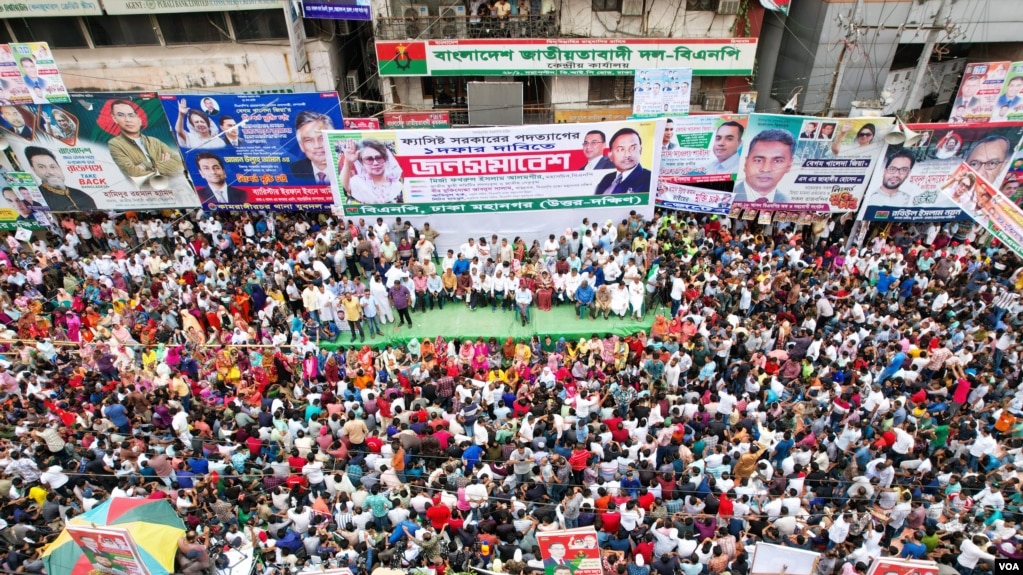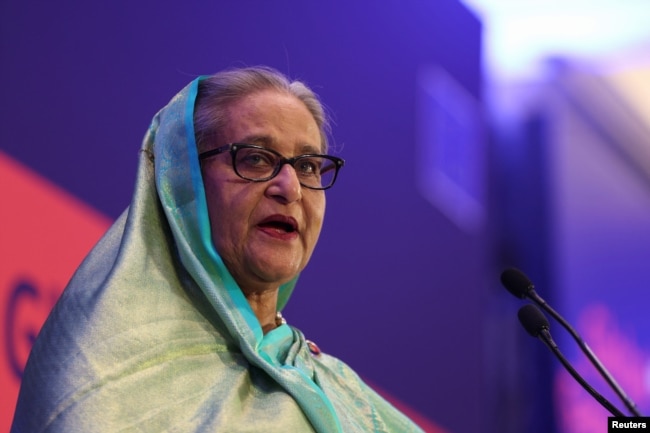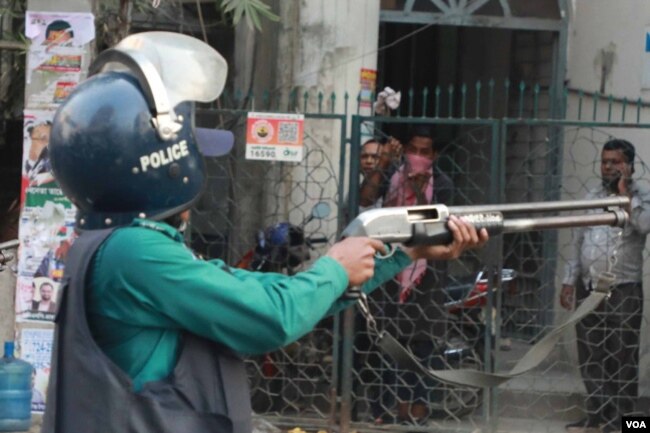Bangladesh Prepping for ‘Unfair’ Election, Say Analysts, Opposition
November 24, 2023
Shaikh Azizur Rahman

Leaders and supporters of the opposition Bangladesh National Party and its allies assemble in Dhaka, July 12, 2023, demanding the resignation of Prime Minister Sheikh Hasina and installation of a neutral caretaker government.
(K.M. Nazmul Haque/VOA)
Although the national poll body of Bangladesh has announced parliamentary elections will be held on January 7, opposition parties, rights activists and political analysts are saying that the situation in the country is not suitable for elections at all.
With a massive crackdown continuing against the opposition political parties, and party leaders and activists still being arbitrarily arrested across the country, the election cannot be free and fair, rights activists said.
“Prime Minister Sheikh Hasina is rapidly filling Bangladesh's prisons with her opponents ahead of the general election in January. In just the last month, Human Rights Watch has documented cases of enforced disappearance, torture, extrajudicial killings and mass arbitrary arrest of the political opposition,” HRW senior Asia researcher Julia Bleckner told VOA.
"The ongoing systematic crackdown on opposition members, critics and human rights activists by Bangladesh security forces makes a free and fair election impossible,” she said.
The opposition Bangladesh National Party (BNP) boycotted the 2014 general elections. In 2018, the general elections were marred by widespread allegations of vote rigging by Hasina’s ruling Awami League (AL).

Although the national poll body of Bangladesh has announced parliamentary elections will be held on January 7, opposition parties, rights activists and political analysts are saying that the situation in the country is not suitable for elections at all.
With a massive crackdown continuing against the opposition political parties, and party leaders and activists still being arbitrarily arrested across the country, the election cannot be free and fair, rights activists said.
“Prime Minister Sheikh Hasina is rapidly filling Bangladesh's prisons with her opponents ahead of the general election in January. In just the last month, Human Rights Watch has documented cases of enforced disappearance, torture, extrajudicial killings and mass arbitrary arrest of the political opposition,” HRW senior Asia researcher Julia Bleckner told VOA.
"The ongoing systematic crackdown on opposition members, critics and human rights activists by Bangladesh security forces makes a free and fair election impossible,” she said.
The opposition Bangladesh National Party (BNP) boycotted the 2014 general elections. In 2018, the general elections were marred by widespread allegations of vote rigging by Hasina’s ruling Awami League (AL).

Bangladeshi Prime Minister Sheikh Hasina addresses the EU Global Gateway Forum 2023, in Brussels, Belgium, on Oct. 25, 2023.
Since last year, the United States and other countries have urged the Hasina government to hold the next general election in a free and fair manner. In September, the U.S. announced that it had started “taking steps to impose visa restrictions” on Bangladeshi individuals who were found complicit in “undermining the democratic electoral process” in Bangladesh.
Following the announcement of the next general elections schedule, the BNP and its allies have continued to demand the resignation of Hasina. An anti-opposition crackdown by government security forces has led to hundreds of opposition leaders and activists being arrested every day.
Jails full of political prisoners
The country’s 68 prisons, with the capacity to house 42,700 inmates, are severely overcrowded. Bangladesh’s home minister put the figure at 77,200 in September.
Among the inmates, at least 25,000 are political prisoners from the BNP and its allies, a party statement said.
The government actually wants to keep the country’s largest opposition party away from the election, BNP Senior Joint Secretary-General Ruhul Kabir Rizvi told VOA.
“The government has arrested almost all our senior leaders, including the BNP’s secretary-general [Mirza Fakhrul Islam Alamgir] and thousands of party activists, after filing false cases against them, so that our party cannot utilize its full strength to participate in the election,” Rizvi said. “To avoid arrest, hundreds of thousands of BNP leaders and activists are in hiding, away from their homes. The condition for a free, fair and acceptable-to-all election does not exist in the country now.”
It’s “pointless” for the BNP to participate in the general election, Rizvi added.
Mohammad Faruk Hossain, spokesperson for the Dhaka metropolitan police, said that the accusation of filing false cases against the opposition was “baseless.”
“After we receive reports of the BNP or other opposition parties being involved in some violent activities like cocktail bombing, attack[s] on police, et cetera, a primary investigation is conducted by the police," he told VOA. "The police arrest and file cases against someone only if the allegation of the person being involved in a criminal incident is found to primarily true in our investigation."

Since last year, the United States and other countries have urged the Hasina government to hold the next general election in a free and fair manner. In September, the U.S. announced that it had started “taking steps to impose visa restrictions” on Bangladeshi individuals who were found complicit in “undermining the democratic electoral process” in Bangladesh.
Following the announcement of the next general elections schedule, the BNP and its allies have continued to demand the resignation of Hasina. An anti-opposition crackdown by government security forces has led to hundreds of opposition leaders and activists being arrested every day.
Jails full of political prisoners
The country’s 68 prisons, with the capacity to house 42,700 inmates, are severely overcrowded. Bangladesh’s home minister put the figure at 77,200 in September.
Among the inmates, at least 25,000 are political prisoners from the BNP and its allies, a party statement said.
The government actually wants to keep the country’s largest opposition party away from the election, BNP Senior Joint Secretary-General Ruhul Kabir Rizvi told VOA.
“The government has arrested almost all our senior leaders, including the BNP’s secretary-general [Mirza Fakhrul Islam Alamgir] and thousands of party activists, after filing false cases against them, so that our party cannot utilize its full strength to participate in the election,” Rizvi said. “To avoid arrest, hundreds of thousands of BNP leaders and activists are in hiding, away from their homes. The condition for a free, fair and acceptable-to-all election does not exist in the country now.”
It’s “pointless” for the BNP to participate in the general election, Rizvi added.
Mohammad Faruk Hossain, spokesperson for the Dhaka metropolitan police, said that the accusation of filing false cases against the opposition was “baseless.”
“After we receive reports of the BNP or other opposition parties being involved in some violent activities like cocktail bombing, attack[s] on police, et cetera, a primary investigation is conducted by the police," he told VOA. "The police arrest and file cases against someone only if the allegation of the person being involved in a criminal incident is found to primarily true in our investigation."

A police officer fires at opposition BNP activists and supporters in Dhaka, Dec 7, 2022. The police in Bangladesh have been accused of using disproportionately high aggression against the opposition rallyists over the past year.
(K.M. Nazmul Haque/VOA)
In recent days over 400 former lawmakers, senior leaders and activists from the BNP have been sentenced by courts. Among those sentenced were some prospective candidates, a BNP statement said.
Mohammad Ashrafuzzaman of the Capital Punishment Justice Project, who has been documenting rights violations in Bangladesh for more than 15 years, said that Hasina “systematically uses” Bangladesh’s judiciary “as a tool to punish dissidents.”
“The judiciary has been complying with the Hasina regime by convicting the main opposition political leaders en masse prior to the unilateral national election,” Ashrafuzzaman told VOA. “The judiciary, law enforcement agencies, intelligence units and the Election Commission are complementing each other to facilitate a sham election that the people of Bangladesh have already apparently rejected.”
Not a 'genuine' election
Bangladesh is going to hold yet another “one-sided” election, said Badiul Alam Majumdar, founder of Dhaka-based pro-democracy group Citizens for Good Governance.
“Election, by definition, involves an act of choosing by voters from alternative candidates, who are comparable, and the voters enjoy the freedom to choose," Majumdar told VOA. "In Bangladesh's election, we have two major, comparable brands — Awami League and BNP — and in the absence of one of these two, despite the participation of other fringe and king's parties, the voters will be deprived of the opportunity to choose from worthy candidates in a one-sided election.
“Such an exercise, where who will win is almost predetermined, cannot be called a ‘genuine’ election.”
Ali Riaz, professor of political science at Illinois State University, said that a Bangladesh election excluding the major opposition parties and “engineered like the previous two general elections” would have serious consequences, “not only politically but also economically and diplomatically.”
“The 2024 election is heading to be the most consequential election in the history of the country," Riaz told VOA. "How the election is conducted will determine which way the country will be heading – a de facto one-party state like Cambodia or reverse to the democratic path.”
The mass arrests of the BNP leaders and activists ahead of the election and the “conviction of them in unprecedented speed,” even in unfounded cases, have clearly shown that the “ruling party wants to hold an engineered election,” he said.
“The unilateral announcement of the election schedule by the Election Commission has added fuel to the fire,” Riaz added. "The EC is acting as a tool for implementing the ruling party’s design of the engineered election. Any way to have a meaningful election is now almost impossible.”
In recent days over 400 former lawmakers, senior leaders and activists from the BNP have been sentenced by courts. Among those sentenced were some prospective candidates, a BNP statement said.
Mohammad Ashrafuzzaman of the Capital Punishment Justice Project, who has been documenting rights violations in Bangladesh for more than 15 years, said that Hasina “systematically uses” Bangladesh’s judiciary “as a tool to punish dissidents.”
“The judiciary has been complying with the Hasina regime by convicting the main opposition political leaders en masse prior to the unilateral national election,” Ashrafuzzaman told VOA. “The judiciary, law enforcement agencies, intelligence units and the Election Commission are complementing each other to facilitate a sham election that the people of Bangladesh have already apparently rejected.”
Not a 'genuine' election
Bangladesh is going to hold yet another “one-sided” election, said Badiul Alam Majumdar, founder of Dhaka-based pro-democracy group Citizens for Good Governance.
“Election, by definition, involves an act of choosing by voters from alternative candidates, who are comparable, and the voters enjoy the freedom to choose," Majumdar told VOA. "In Bangladesh's election, we have two major, comparable brands — Awami League and BNP — and in the absence of one of these two, despite the participation of other fringe and king's parties, the voters will be deprived of the opportunity to choose from worthy candidates in a one-sided election.
“Such an exercise, where who will win is almost predetermined, cannot be called a ‘genuine’ election.”
Ali Riaz, professor of political science at Illinois State University, said that a Bangladesh election excluding the major opposition parties and “engineered like the previous two general elections” would have serious consequences, “not only politically but also economically and diplomatically.”
“The 2024 election is heading to be the most consequential election in the history of the country," Riaz told VOA. "How the election is conducted will determine which way the country will be heading – a de facto one-party state like Cambodia or reverse to the democratic path.”
The mass arrests of the BNP leaders and activists ahead of the election and the “conviction of them in unprecedented speed,” even in unfounded cases, have clearly shown that the “ruling party wants to hold an engineered election,” he said.
“The unilateral announcement of the election schedule by the Election Commission has added fuel to the fire,” Riaz added. "The EC is acting as a tool for implementing the ruling party’s design of the engineered election. Any way to have a meaningful election is now almost impossible.”
No comments:
Post a Comment